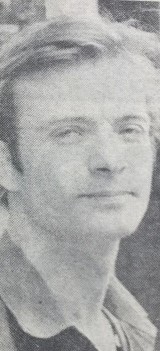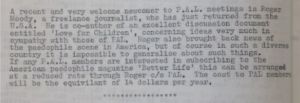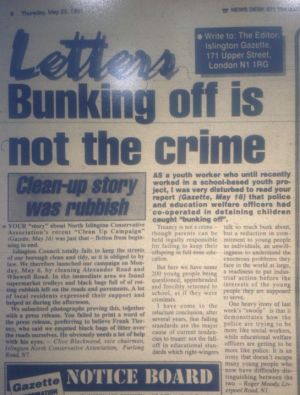One of our staff members is contributing considerably to a News Archiving service at Mu. Any well educated (Masters, PhD or above) users who wish to make comments on news sites, please contact Jim Burton directly rather than using this list, and we can work on maximising view count.
Roger Moody

Roger Moody (Born circa. 1940 - Died June, 2022) was a British socialist and civil libertarian MAP author, social worker, political theorist and activist for various left-wing causes. These causes included labor/worker's rights, the rights of indigenous peoples and mining communities, nuclear disarmament and an opposition to war, and the right of mutually willing sexual expression for sexual minorities, including MAPs and young people. Moody was an "out"/open pedophile during the 1970s, before this previously obscure psychiatric term became widely known in Britain and heavily demonized/stigmatized in the 1980s (Basannavar, 2019).[1] Moody briefly became the co-editor of the longstanding pacifist magazine Peace News (1936-present)[2], publishing a short book through Word is Out/Peace News entitled "Indecent Assault" (1980).[3] Structured as a collection of diary entries, Indecent Assault gives Moody's reflections during the proceedings of a legal case brought against him, which alleged 4 counts of sexual touching (known legally as "indecent/sexual assault") and 1 count of attempted anal sex ("attempted buggery") with a 10-year-old male. Moody was acquitted of these charges in April 1979, and continued to publish on and participate in a wide variety of political movements, including MAP-related activism with writings such as "How to Make Paedophilia Acceptable" (1986) and "Man/Boy Love and the Left" (1981), which we archive and summarize in this page.
PAN Magazine (1980, below) credited Moody with publishing "the first article ever to appear in a British journal (Peace News) in which the author identified himself as a paedophile" (p. 15), in October 1975. Moody was most publicly active in the 1st wave of the MAP Movement during the 1970's, with his name being mentioned in PAL (Paedophile Action for Liberation's) Newsletter "Palaver" in its June/July 1975 issue.

The minute meetings of the Conspiracy Against Public Morals committee (CAPM), suggests that Moody was involved in efforts to protest and overturn the legal indictment of 5 PIE members, which famously saw PIE chairman Tom O'Carroll imprisoned for 2 years for 'Conspiracy to Corrupt Public Morals'.[4] We have no indication that Moody was ever a member of PAL, and MAP activist Tom O'Carroll stated in a 2022 obituary that Moody was never a member of PIE, the Paedophile Information Exchange which succeeded PAL.[5] Moody died peacefully in his home in June, 2022.
Moody's left-wing activism
According to an obituary in Peace News, Moody was vegan "before it became fashionable," and "sometimes adopted contrarian positions almost as a way of testing people’s commitment to their own views."[6] A lengthy discussion of Moody's life is provided by Cassandra Cogno Russell (Oct. 2015).[7] Russell claims Moody was a graduate from the University of Edinburgh, and that Moody was offered a character reference from Member of Parliament (MP) Gwynfor Evans before his 1979 trial.[8] Evans is claimed to have met Moody in Vietnam, as part of the the peace-group Non-Violent Action in Vietnam's campaign to send British delegates to Vietnam in August, 1967. "Although initially keen," Russell writes, "the MP's party HQ had told him not to appear in person on behalf of the outspoken paedophile activist, since "they feared further 'adverse publicity' after a recent bad run." In 1971, Moody co-founded Operation Omega with Paul Connett, a non-violent group taking humanitarian aid into East Pakistan during the Bangladesh Liberation War.
Moody's non-MAP focused activism is explained in a 2022 obituary.[9] According to the obituary, Moody "was born in Bristol in the 1940s [...] active in the peace movement and, along with his friend Jan Roberts, set up CIMRA (Colonialism and Indigenous Minorities Research and Action) to stimulate support for indigenous land rights struggles across the world." Moody was "centrally involved" in the "Mines and Communities network," established in 2001 to share information on mining, with Moody's focus being on Asia-Pacific mining. "In 2019," the author reports, "Mines and Communities was awarded the UK-based Gandhi Foundation's prestigious Peace Prize, largely because of Roger's work on mining in India.":
For many years, Roger cared for his older brother Peter, who had Down's Syndrome [...and] died in 1998 [...] Roger and Peter wrote a book about their life together, called "Half Left". (Peter would usually reply to the question, "Are you all right Pete?" with the quip, "No, I'm half left.") Roger actively promoted the rights and welfare of people with Down's Syndrome, and much of his passion for solidarity with those who are different from expected social norms sprang from his love and respect for his older brother. [...] Roger wrote many, many articles and books. Among his major books on mining are "Plunder!" (a history of RTZ to 1991), "The Gulliver File" (an encyclopedic history of world mining companies to 1992), "Into the Unknown Regions" (about submarine disposal), "The Risks We Run" (about mining political risk insurance), and "Rocks and Hard Places: The Globalization of Mining". Roger accumulated a number of aliases during his writing career, notably Digby Knight and Mogador. Friends in India loved to call him Rajah Moody. Over the last two decades, he usually wrote under the banner of Nostromo Research, named for the character in Joseph Conrad's novel of the same name.
Moody's MAP and Youth-related writings
Since Moody is known to have used pseudonyms, we archive and summarize/quote Moody's writings on intergenerational sexuality that are written without a pen-name.
- "the "vilest People in britain"" - in Peace News (1975).
- Paedophile Politics, PIE Newsletter No. 8 - autumn 1975.[10] A shorter version of this article appeared in Gay Left No. 2 (Spring 1976)
- Roger Moody. (May, 1980). 'Child Protection, English Style', in PAN: A Magazine about Boy-love, pp. 15-19.
- Roger Moody. (1981). 'Man/boy love and the Left', in The Age Taboo: Gay Male Sexuality, Power and Consent, ed. by Daniel Tsang (Alyson Publications: Boston, and Gay Men's Press: London), pp. 147-155.
In the above article, Moody conducts a historical retrospective of age-disparate homosexuality (then "pederasty") from the 1900's to 1980. He identifies 3 developments which "came from within the radical movement" and "were to halt any burgeoning idea that children's autonomy and free adult/child sensuality might be inter-related" (p. 149). These are gay assimilation / "the mainstream gay movement's readiness to adopt the medical-pychiatric model of pedophilia, and equate man/boy love with molestation. [...] [A] strategy of pure self-defence"; the adoption of "child protection" discourses via the women's/feminist movement; and the retreat of the communes movement and widespread embracing of notions of privacy and exclusiveness. Similar to the argument of historian Rachel Hope Cleves 40 years later,[11] for Moody, "the perception of pederasty has drastically changed and will - under the impact of feminist thinking, gay liberation praxis and above all, children's changing awareness - never be simple again" (p. 154):
In a real sense, "pederasty" was defeated by the invention of "pedophilia" - and due not to the discovery of adult traumas brought on by infantile sexual experience, but to the creation of modern childhood. Industrial capitalism, as Philippe Aries has pointed out in Centuries of Childhood (1962), gave birth to the creation of the nuclear family. Henceforth children were to be abstracted from street life and amorphous communities, and brought up as potential wage-laborers. [...] At that point, both women and children became increasingly confined to the home. [...] [S]exuality for its own sake became proscribed. Generative [reproductive] sex eclipsed non-generative" (p. 148).
- When the law goes below the waterline, Roger Moody, Letters to the Editor, The Guardian, 1 August 1983.
- 'Not so menacing a magazine' Roger Moody, Letters to the Editor, The Guardian, 4 May 1984.
- Roger Moody. (1986). 'Ends and Means: How to Make Paedophilia Acceptable...?', in The Betrayal of Youth: Radical Perspectives on Childhood Sexuality, Intergenerational Sex, and the Social Oppression of Children and Young People, ed. by Warren Middleton (CL Publications: London), pp. 120-133.[12]
In How to Make Paedophilia Acceptable, Moody argues that free sexual expression in childhood is tied to the degree of historic constraint around young people's freedom and participation in society: egalitarian 'primitive' societies tended to impose less restriction and are consequently more permissive, whereas post-industrial 'civilized' societies reflect the opposite trend. Like gay historian John D’Emilio, who argued that capitalism and other social forces outside the control of activists were the driving force behind gay liberation,[13] Moody argues that there can only be liberation of "pedophilic relationships" rather than pedophiles as such, because such liberation would be "contingent on the freedom of both the younger and the older person to withdraw without and form of blackmail or hurt, and also to relate freely to others of any age or gender" (p. 124). The notion of a 'sexual utopia' where freedoms emerge from abstract ideas of equality, not fundamental changes in social organization, Moody calls the "utopia myth". Similar to political scientist Harris Mirkin,[14] Moody cites Paulo Freire to argue that "the mystification of language is the basic tenet of social control." MAPs need to recognize that sex is given primacy in the West "because it is uniquely situated to being channeled and manipulated by the powerful in the interest of maintaining their power" (p. 122), and respond with accounts in their own language which do not reproduce the social-control terminology of an oppressive society.[15] Pre-dating modern transgender politics, Moody argued for a separation between sex and gender, and consequently, that MAPs have been held back by not treating male and female experiences as separate and fundamentally different. Moody concluded with 3 "essential" medium-term aims:
- The dissolution of all specifically pedophile campaigning groups; though not the self-help and advice groups which are essential for isolated paedophiles.
- The clear identification of homosexual pedophilia as a gay and feminist issue.
- Form and support "new children's liberation groups and publications whose objective is to enable and encourage young people to express and publish their own views on sexuality and autonomy. [...] The final objective must be clear throughout: to reject the notion of 'sex education' as an adult imposed form of control, and to sponsor any initiatives by young people asserting the importance of their own experiences, needs and discoveries. After all, it is mostly their world and not ours into which they are growing." (p. 130)
- “Bunking off is not the crime” Letter from Roger Moody, Islington Gazette, 23 May 1991 p.8

- Roger Moody. 'The Importance of Being Peyrefitte', The Guide, May 2002.
In this article, Moody reflects on the life of the openly homosexual and pederastic French author Roger Peyrefitte (born 1907), after his death in November, 2000. Moody compares Peyrefitte to Oscar Wilde, and more:
While Oscar claimed to have put his genius into his life, Roger spent 50 years painstakingly inscribing his into books. During Wilde's lifetime, the "love that dare not speak its name" was almost exactly that. In contrast Peyrefitte trumpeted it from the Parisian rooftops. From there, he swooped down Zeus-like on often-willing Ganymedes, gathering them from the hillsides of Greece, Taormina, and La Touraine, the dingy cinemas of Naples, Rome, and Paris, and the beaches and squares of colonized north Africa. Surprisingly, Peyrefitte never ended up in court on either sex or libel charges, though he was several times arrested. On such occasions, he would shamelessly flash his credentials as an ex-diplomat, or drop evocative names
[...]
With the publication in 1944 of his first book "Special Friendships", Peyrefitte at 37 became an overnight sensation, winning the prestigious Prix Theophraste-Renaudoux, and just missing the Prix Goncourt itself. This eloquent and gripping account of the passion between an older and younger schoolboy – violently thwarted by the creepy Father de Trennes, himself secretly in lust for the younger 13-year-old – has surely never been bettered, though scores have tried. Friendships was based on his Peyrefitte's own experiences at a Catholic college, and triangular, intergenerational emotional relationships were to become the template for some of his most affecting output.
Trial for obscenity and support from feminists
We have received the following information from a pro-sex feminist activist associated with the UK group Feminists Against Censorship,[16] who was friend of Moody's during his life:
Moody was prosecuted under the Protection of Children Act for possession of a slide of a naked youth (possibly masturbating). Moody had been sent a number of slides by someone in USA who read his article on the Protection of Children Act in Peace News. Roger thought that the slides were unethical and tried to destroy them, however, many years later his home was raided by the police and a single slide had wedged itself behind a filing cabinet. The police seized this slide and a number of non-Pornographic photography books which included naked children.
He was represented by civil liberties solicitor Bill Nash and 8 members of Feminists Against Censorship demonstrated support for Roger outside the court, all respectability dressed
The magistrate threw out the case of the photographic books but he was convicted of possession of the slide. We all agreed that if he didn't know he had it, he wasn't really in possession of it. The Sex Offender Register was coming in soon, meaning that if he lost the appeal he might be put on the register and no longer be able to travel to India. So he paid the fine. After this a teacher had one of the same books that Roger had been acquitted over and was successfully prosecuted. Over the years he tried every way to get his conviction overturned without success, even trying to take the case to the European Commission for Human Rights.
See also
- North London: Youth worker Roger Moody was a proud paedophile (Islington Gazette, 28th March 2023) - A negative obituary which platforms an alleged victim of Moody. As with all information on this website, we invite readers to critically engage with information and come to their own conclusions...
References
- ↑ Basannavar, Nicholas Ranjan Gadsby. (2019). Speaking about speaking about child sexual abuse in Britain, 1965-1991. [Thesis]
- ↑ See also https://web.archive.org/web/20190510221337/https://peacenews.info/node/6200/peace-news-first-75-glorious-years
- ↑ Indecent Assault, by Roger Moody
- ↑ https://spotlightonabuse.wordpress.com/2017/09/27/islingtons-pro-paedophile-activists-network-roger-moody-and-sandy-marks/
- ↑ See RODGER THE DODGER, WHO BEAT THE RAP, in https://heretictoc.com/2022/06/16/lets-be-clear-about-prepubertal-orgasm/
- ↑ https://peacenews.info/node/10334/obituary-roger-moody-1940s-june-2022
- ↑ https://web.archive.org/web/20190709133756/https://www.byline.com/column/27/article/457
- ↑ Gwynfor Evans was parliament's first MP for Plaid Cymru, representing Carmarthen from 1966-1970 and 1974-1979
- ↑ http://www.voxy.co.nz/national/5/403589
- ↑ Paedophile Politics, PIE Newsletter No. 8 - autumn 1975.
- ↑ Cleves similarly wrote: "During the late 1980s and 1990s, the figure of the monstrous pedophile took center stage in the cultural imagination of English-speaking countries, entirely replacing the earlier ambivalent figure of the pederast. The pedophile, or child sexual predator, was the subject of sex crime panics on both sides of the Atlantic. People who wrote or spoke about adult-child sex in non-condemnatory terms risked public attack. The rhetoric of molestation became “so powerful that those who do not join in its danse macabre are often accused of participating (either literally or figuratively) in the abuse.” (Unspeakable, 2020, pp. 278-279).
- ↑ 'Ends and Means: How to Make Paedophilia Acceptable...?', in The Betrayal of Youth: Radical Perspectives on Childhood Sexuality, Intergenerational Sex, and the Social Oppression of Children and Young People, ed. by Warren Middleton (CL Publications: London), pp. 120-133.
- ↑ See John D’Emilio's chapter in, Against Equality Queer Revolution, Not Mere Inclusion, ed. by Ryan Conrad (AK Press, 2014) https://library.lol/main/DD4D1C4C3CE07971C2DE09315132F098
- ↑ Harris Mirkin, 'The Pattern of Sexual Politics: Feminism, Homosexuality and Pedophilia', Journal of Homosexuality (1999). https://www.ipce.info/ipceweb/Library/mirkin_text.htm
- ↑ Moody cites Charles Shivley in Fag Rag, and Daniel Tsang's then defunct Gay Insurgent.
- ↑ https://en.wikipedia.org/wiki/Feminists_Against_Censorship